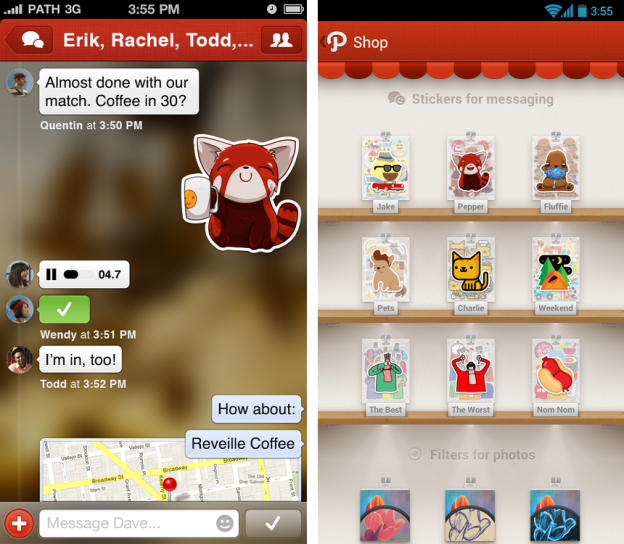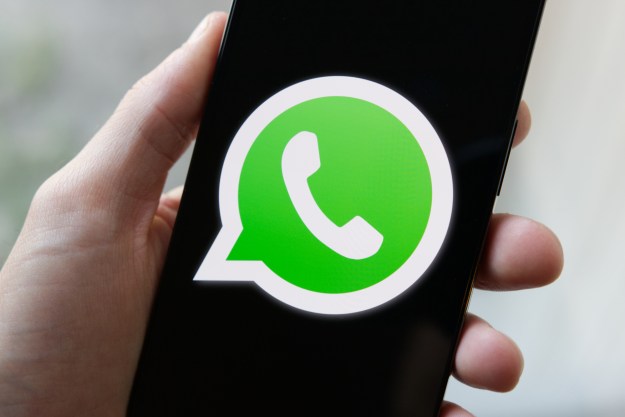
Facebook has been the social ring leader before social media was even a fully recognized market. But lately, from the outside Facebook is looking less like a leader and more like a follower – which is partially expected, given its position. Once you get to a certain size, a company is maintaining innovation. “Disruption” rarely happens any more. This maintenance is no small order, however – just look at Facebook’s transition into mobile.
Trying to “get” mobile was painful for Facebook, to say the least, and the users ended up inconvenienced. The situation has been improving since the team decided to give up on HTML 5 and go native, but there are more threats on the horizon. Keeping Facebook relevant will be a challenge and with the introduction of the new News Feed, we have to ask: is Facebook stalling its own growth and giving alternative mobile-only apps a leg up?
The truly mobile social network
One of the largest looming threats to Facebook coming from messaging apps is their transition into mobile-only, more personal social networks.
Why are messaging apps evolving into social networks? Well, first off because these apps can. Messaging circa WhatsApp has proven to be wildly popular, and there’s enough evidence based on downloads, engagement, and usage metrics to show us that its popularity isn’t a fad.
Second of all, communication and social networking really do go hand-in-hand. As much as broadcasting your every move to the public is what Facebook wants you to do, in many instances we’d prefer to communicate with friends at a personal level. So we keep in touch with closer friends through GChat, Facebook Messenger, SMS, or other or other means like messaging apps. What the slew of new messaging apps are doing is exactly what Facebook does, but in reverse: Instead of starting as a place for public communication where you can then tailor it down to individuals, you start out privately sharing and then building your circle out from there. In an age where privacy is a major concern, selective sharing is becoming a popular idea.
In a study, Facebook researchers even admit that news feeds are really a critical part of a social network, and reasons that “these short updates allow individuals to keep tabs on many ties at once, without the purposeful effort of an email or phone call.” It’s a feature messaging apps like LINE, WhatsApp, and Tango have all built in, and a major reason why they’re becoming popular alternatives.

LINE for starters realized that its social network foray was absent a newsfeed so it introduced its own take back in July of last year named Timeline. “Timeline” is a name probably chosen out of more than mere coincidence, with features we’ve seen before like status updates, and photo and video sharing. Then there’s WeChat’s Moments, which by its look and feel really is uncanny to Facebook’s Timeline but acts like a news feed.
Threats from all sides
There is almost no contending with Facebook’s 1.1 billion users. Popular messaging apps WeChat has 300 million, and Line 100 million. But looking at usage on a market-by-market level basis, you’ll see that Facebook, while a domineering voice in the West, isn’t as dominant in the East as it needs to be to set itself apart from competitors. For instance LINE is a force in Japan with 40 million users to date, while Facebook has 13.8 million users there. WeChat’s largest user base comes from China, where Facebook is completely blocked off for those without a VPN and officially has only a few hundred thousand users.
What’s threatening to Facebook is that now with a comfortable foothold in the Asian markets where Facebook lags behind (or isn’t present at all), these apps are starting to move beyond this territory into new, western waters. LINE is making a play for Europe, the U.S., and Latin American markets, while rumor has it that WeChat’s shopping around for a San Francisco office to kick start its global expansion plans.
Facebook’s woes don’t end with the East. We’ve witnessed home grown messaging apps like Tango and even the chatting client Imo.im slowly evolve into mobile social networks. Tango in its latest branding efforts coming out of announcing its 100 million user milestone, positioned its messaging to associate “social network” with “Tango” when the company reached out to us. Imo, quietly rolled out a newsfeed of its own called “Broadcasts.”

The shocker as of late was mobile social network Path and it’s foray into messaging. Its messaging features were obviously heavily influenced by popular messaging apps judging from features like stickers, messaging, and push-to-talk making it into the latest update. Although with Imo’s six million mobile downloads, and Path’s six million users, these apps aren’t really “threats” per-say as they are just examples of the growing message-social network trend today.
Have we reached peak Facebook levels?
Facebook’s other major threat? Facebook.
Facebook has taken a huge risk by hedging its future on content, something the updated news feed release revealed. But this is a crowded space, filled by the likes of Pulse, Flipboard, and Zite. “Any step toward personalized news is a step in the right direction. I don’t think it has any implications for Zite. We’ve tried experiences before where personalized news is a small addition to a product whose focus is something else, and invariably found that people prefer a dedicated news experience. The two are complimentary, not competitive,” Zite CTO Mike Klaas says.
And teens, as we’ve reported before, might simply be losing their interest in Facebook. Even adults might be burned out. A Pew study found that 27 percent of users will decide to spend less time on the site, while 7 percent said they’d spend more time. 20 percent of online adults said they once used Facebook but quit cold turkey. What might be more alarming though is that 28 percent of Facebook users have said that Facebook is “less important to them than it was a year ago,” compared to 12 percent of users who said that it was more important. 34 percent of users say they’re spending less time on Facebook, while 13 percent say they’re spending more time using the social network. This particular age group has showed a significant interested in messaging apps, as well apps that have some sort of privacy or personal network built in (even falsely built in, a la Snapchat).
Facebook’s competitive (and anti-competitive) future
Clearly, Facebook realizes that it holds all the cards when it comes to outside app threats in many concerns – all you have to do is look at its hit list to see who’s tread to closely on its turf. There’s a sense that Facebook is living on borrowed time, but of course it has a lot of that in storage to survive on, despite looming threats from messaging apps (or anyone else for that matter). “Because Facebook is so big, their challenge is different and unique. It (Facebook features or services) just needs to be a ‘new innovation’ for people who use Facebook all the time,” David-Michael Davies, Executive Director of The Webby Awards, says. In other words existing users just need to be satisfied with new Facebook features they’ll probably (or even just possibly) use, even if it they technically weren’t Facebook’s idea.
“Maybe Facebook innovates around the edges, but as people are using their services people in other places with new ideas around the world change. Social networks don’t change themselves, so they end up just going away because the idea they came up with in 2003 was great then but it’s just not that interesting to people in 2007. So I think for Facebook to not become Friendster but instead a social network of a billion users that lasts another 20 years, they’re going to have to announce new products, and I’d even say more dramatic innovations, every year, maybe even every two months.”
There may be new apps chomping at the bit, but at least for the moment, Facebook is still just racing itself.
Editors' Recommendations
- Meta’s ChatGPT killer is taking over your favorite apps
- Google Messages vs. Samsung Messages: Which app should you use?
- Google just redesigned one of its biggest apps, and it’s bad
- Nothing’s iMessage for Android app is unbelievably bad
- One of our favorite Android phones just got its own iMessage app
